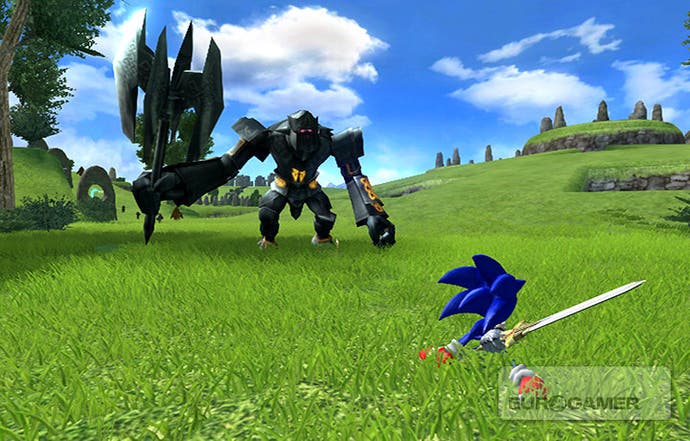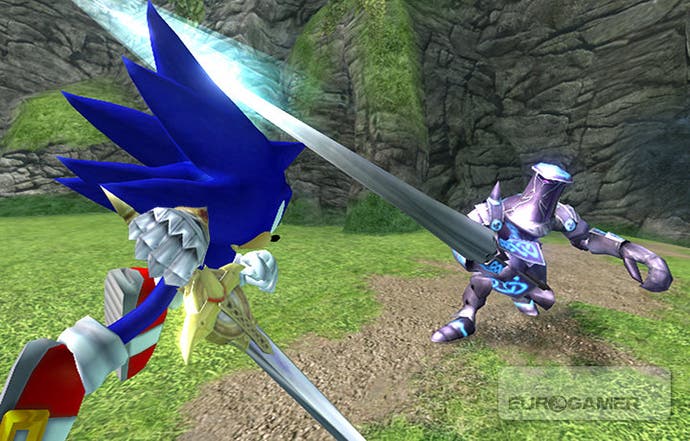Sonic and the Black Knight
Can we have Billy Hatcher back, please?
For the first half of the game, Black Knight is inane, good-looking, and mostly pleasant: you lower your expectations, shake your remote, and burn through the game without a care in the world. The opening two hours left me with the suspicion I'd actually become brilliant at Sonic, but the truth is, simplified and mollycoddled, it's impossible not to be brilliant at what the series has had to become - an on-rails platformer without meaningful challenge; the videogame equivalent of one of those Reader's Digest lotteries that you literally cannot lose.
For the game's second half, the developers try to crank things up, prodding you into increasingly complex corridors, with falling rocks and flaming pits, and asking you to indulge in some precision platforming. The ambition is to the designers' credit, but the results, sadly, aren't. With controls this vague, and visual feedback that tends towards sluggish animations - generally featuring Sonic flying into an abyss when he's meant to be hitting someone with his sword - the game is throwing into the mix the one thing this pretty rollercoaster can't entirely handle: a player.
The predictable argument would be that this is a game for kids, and that I should get back to my middle-management strategy games and bowler-hat sims. While that will explain why it goes on to sell a million copies, and almost excuses the non-game handling of the first half, it makes it harder to justify the intensely frustrating difficulty spikes which mar the second - moments where you get stuck between the controls and the design, and suffer a punishing string of cheap deaths as miserly checkpointing combines with a lazy camera and the controls start to register disastrous phantom moves you didn't even know were available, and certainly hadn't tried to pull off.

And yet, there are moments when you'll find yourself really enjoying things. There's always room for the colourful, big-budget spectacle that Black Knight regularly delivers, of course, and there are a few rare levels where things actually click - where you sense that you're genuinely in control, and the environment isn't creating challenges the game hasn't given you the tools to deal with. But such moments are fleeting, and the other things Black Knight has brought along to pad out the experience - a light RPG element, item collection, leaderboards and a lame multiplayer battle mode - add very little.
SEGA's going through a promising renaissance as a publisher at the moment, with bizarre treats like MadWorld, Infinite Space and Bayonetta nestled in alongside brainy favourites like Empire: Total War, and it's increasingly hard to see what Sonic can add to this kind of line-up. Sonic's not much of a werewolf or a knight. He's not actually much of an anything: he's a reactionary idea perfectly tailored for a 2D world, and, unfortunately, in 2009 that makes him about as relevant as a ticket to go see Penny Farthings race around the decks of the Titanic.

A hedgehog out of time, he's become a bit like the shambling old duffer sitting in the corner of a modern office building. Back in the days of ledger books and hand-cranked adding machines, this guy was an unstoppable winner, but when computers came in and he could never quite get his head round Excel, he should have been pensioned off for a luxurious retirement, or quietly whacked over the back of the head during a staff meeting, and buried under the server room.
But he wasn't, and so he comes in every day, pecking disastrously at a workstation he doesn't understand, sending out the wrong kind of invoices, crafting letters filled with random gibberish, and finally completely deleting the stockroom inventory and sinking the entire company. Sonic's stuck in a rut, then: he can run as fast as he likes, but no matter the fancy new tricks he learns, he just can't seem to keep up any more.








